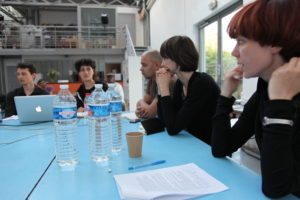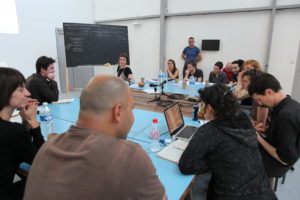Ana Vujanović (2009)
If the death of art is its inability to attain the concrete dimension of the work,
the crisis of art in our time is, in reality, a crisis of poetry, of ποίησις.
Ποίηις [… is] the very name of man’s doing, of that productive action
of which artistic doing is only a privileged example,
and which appears, today, to be unfolding its power on a planetary scale
in the operation of technology and industrial production.
(Giorgio Agamben, The Man Without Content)
This essay is conceived as a critical overview of the concepts supporting the principles and procedures of work in art, and their numerous and non-linear transformations throughout the history of Western culture. It is, accordingly, established as a kind of introductory assessment of the ways of work and cooperation in contemporary performing arts, without dwelling on their particularities and elaboration of the resulting collaborative modes. Indeed, my intention is not to come up with a universal ‘glossary’, but to critically focus on the concepts much too often taken for granted in the contemporary performing arts world. The central problem is, consequently, outlined from a macro-social perspective: I start from the economic/political contexts, since the 18th century’s Industrial Revolution to the current frameworks of post-Fordism and cognitive capitalism. Against this backdrop I am looking at a number of artistic paradigms which have considerably contributed to the changes in perception of artistic work throughout the 20th century: Benjamin’s concept of art in the age of mechanical reproduction (photography and film); Duchamp’s ready-made; Warhol’s pop art; digital art and (Bourriaud’s) post-production. The anticipated result from thus conceived piece of writing is sharpening of concepts frequently employed within the contemporary art scene – like immaterial work, creativity, practice, cooperation, process, reproduction, intervention etc. – in reference to their origins in Western philosophy, political theory and, particularly, material social circumstances.
Continue reading →

